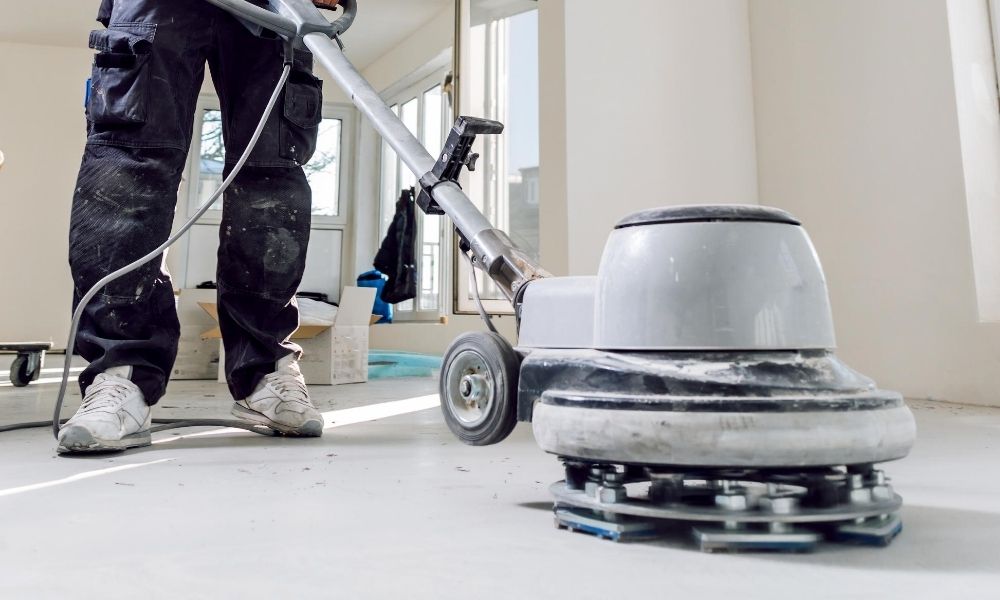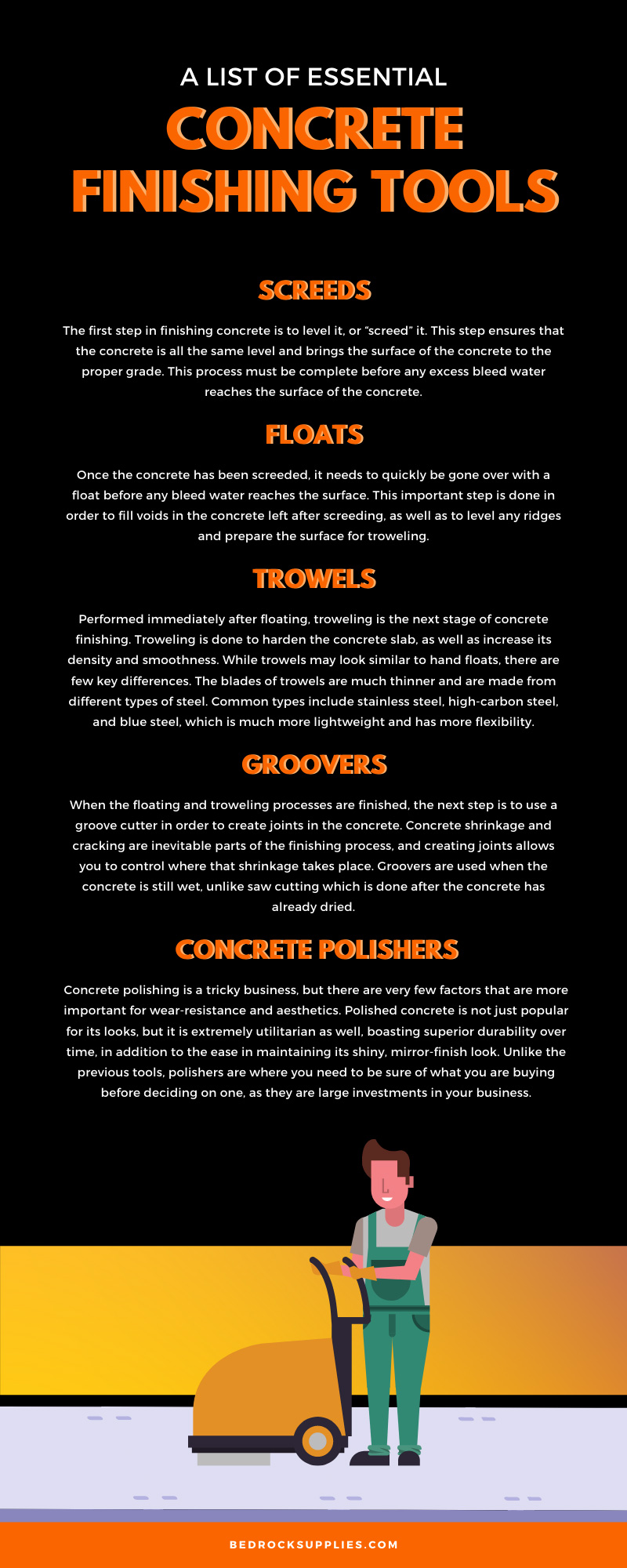 Loading... Please wait...
Loading... Please wait...- 774-991-2658
- My Account
- Home
- Blog & Tips
- A List of Essential Concrete Finishing Tools
Categories
A List of Essential Concrete Finishing Tools
Posted by Matt Tetrault on 14th Aug 2020

A good foundation is arguably the most important aspect of any construction job. Whether you are laying the foundation for a home or just constructing new sidewalks, finishing concrete is not a task to take lightly. The goal of getting that perfectly smooth and shiny finish to your concrete is one that takes time and effort to get right.
The temptation exists to buy brand new, expensive electronic finishing tools, but you will find that there is still no replacement for good old hand tools for smaller jobs. With a few important concrete surface preparation tools, you won’t have to worry about whether your concrete is ready to go, no matter what kind it may be. This list of essential concrete finishing tools will help you make sure that you are ready for this all-important step.
Screeds
The first step in finishing concrete is to level it, or “screed” it. This step ensures that the concrete is all the same level and brings the surface of the concrete to the proper grade. This process must be complete before any excess bleed water reaches the surface of the concrete. While there are many kinds of screeding tools, from old-fashioned hand ones to new mechanical options like vibratory and oscillating tools, oftentimes the simplest answer is the best solution. Something as simple as a wooden 2x4 can be used, assuming you have already checked it for imperfections and made sure it is straight and true. There are also magnesium and aluminum straightedges that are resistant to warping and will not be stained by the concrete. Power screeds only need to be considered if the job you need them for is especially large.
Floats
Once the concrete has been screeded, it needs to quickly be gone over with a float before any bleed water reaches the surface. This important step is done in order to fill voids in the concrete left after screeding, as well as to level any ridges and prepare the surface for troweling. An added benefit going forward into the next few steps is that this step can also slightly embed coarse aggregate into the concrete. Floating does not completely close the surface of the concrete, which allows all that excess bleed water to be removed after it is done. Common float types include wood, magnesium, and aluminum. However, there are a few less common types of floats such as resin, rubber, or stainless steel as well. If your job is especially large, look for bull floats that come with long handles for covering a larger surface area.
Trowels
Performed immediately after floating, troweling is the next stage of concrete finishing. Troweling is done to harden the concrete slab, as well as increase its density and smoothness. While trowels may look similar to hand floats, there are few key differences. The blades of trowels are much thinner and are made from different types of steel. Common types include stainless steel, high-carbon steel, and blue steel, which is much more lightweight and has more flexibility. The benefit of sticking with stainless steel is that it will not rust or create any stains on the surface of your concrete. If your job is on the larger end of the spectrum, fresno trowels are trowels attached to bull float handles. Fresno trowels are useful because they allow the troweling process to be done without needing to walk out onto the slab, but they do not allow for as much pressure to be used. This can sometimes produce less dense and less wear-resistant concrete.
Groovers
When the floating and troweling processes are finished, the next step is to use a groove cutter in order to create joints in the concrete. Concrete shrinkage and cracking are inevitable parts of the finishing process, and creating joints allows you to control where that shrinkage takes place. Groovers are used when the concrete is still wet, unlike saw cutting which is done after the concrete has already dried. Groovers are usually made from stainless steel and bronze, but the most important part of a groover is the bit that actually makes the groove. They come in different sizes, both in the length and the width of the groove, so it is important to know the look you are going for before buying a new groover. A good rule of thumb is to have your bit depth be about one-fourth the thickness of the slab itself; for example, a four-inch slab would need a one-inch deep groove.
Concrete Polishers
Concrete polishing is a tricky business, but there are very few factors that are more important for wear-resistance and aesthetics. Polished concrete is not just popular for its looks, but it is extremely utilitarian as well, boasting superior durability over time, in addition to the ease in maintaining its shiny, mirror-finish look. Unlike the previous tools, polishers are where you need to be sure of what you are buying before deciding on one, as they are large investments in your business. When buying diamond cup wheels for grinding and polishing, know that you will need to have multiple grits and sizes depending on the equipment you are using and the final finish you are going for.
Protection Equipment
While not necessarily a tool, protection equipment is still absolutely essential to the concrete finishing process. Grinding and polishing create lots of dust and particulates that no one should be breathing in. Providing face masks is only the first step to ensure that your workers do not inhale these harmful particles. Dust-collection equipment is not often integrated into grinders used to polish floors, meaning that you will need to buy separate equipment for this task. Not only does dust-collecting equipment protect the people working, it also reduces the amount of dust on the concrete, allowing workers to more accurately see the scratch pattern in their grinding. Simple items like gloves and eye-protection should not be overlooked. Your workers are the key to your business, and keeping them safe should be your number one priority.
Hopefully, this list of essential concrete finishing tools has given you the basics you need to know before starting any large concrete job. Concrete has become a low-cost and attractive option for many different clients, so knowing everything you will need to begin the process is crucial to your success.
Bedrock Supplies is positioned to be your one-stop-shop for any of your concrete finishing needs. Our diverse selection of products will keep you well stocked with everything you need to get the job done right, the first time.

